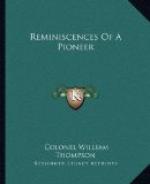Geo. L. Curry, Governor of the Territory of Oregon, at once issued a call to arms and volunteers from every part of the territory instantly responded. A company of U. S. dragoons under command of Capt. A. J. Smith, who subsequently achieved fame in the war of the States, was stationed in Southern Oregon, and rendered all possible aid, but the slow tactics of the regulars was illy calculated to cope with the savages. The main reliance, therefore, must be placed in the citizen soldiery. Every county in the Territory answered the call to arms, forming one or more companies, the men, as a rule, supplying their own horses, arms, ammunition, and at the beginning of the outbreak, their own blankets and provisions. There was no question about pay. The men simply elected their own officers and without delay moved to the front.
Linn county furnished one company under Capt. Jonathan Keeny and went south to join Col. Ross’ command and was joined by many of our neighbors. My two brothers also went with this command, one as teamster, the other shouldering the spare rifle. As previously remarked, age was not considered, the boy of 14 marching side by side with the gray haired man, armed with the rifles they brought from the States. The ammunition consisted of powder, caps and molded bullets, nor was the “patchen” for the bullet omitted. The powder was carried in a powder horn, the caps in a tin box, the bullets in a shot pouch and patchen for the bullets was cut out the proper size and strung on a stout leather thong attached to and supporting the shot pouch and powder horn.
In the fall after the departure of the first contingent, and at a time when families were practically defenseless, news reached us by a tired rider that 700 Indians had crossed the trail over the Cascade mountains and were burning the homes and butchering the settlers on the Calapooya, twenty miles away. The news reached us in the night, and one can easily imagine the confusion and consternation that everywhere prevailed. To realize our situation one must remember that most of the men and about all of the guns had gone south. I shall never forget the awful suspense and dread that prevailed in our home as the family sat in a group through the long weary hours of that night, anxiously awaiting the return of the day, yet dreading what the day might bring forth. Horses were gathered and securely tied about the house, and such arms as we possessed made ready for instant use. At last day broke, and searching with the eye the almost boundless prairie, no enemy was in sight.
As the sun rose above the rim of the distant mountains my father determined to disprove or verify the rumor. Neighbors sought to dissuade him, but mounting a swift horse he started for Brownsville on the Calapooya. Meantime everything was in readiness for forting up should it become necessary. The day wore on, still no news. In vain we gazed from the house top over the prairie for a sight of a horseman.




